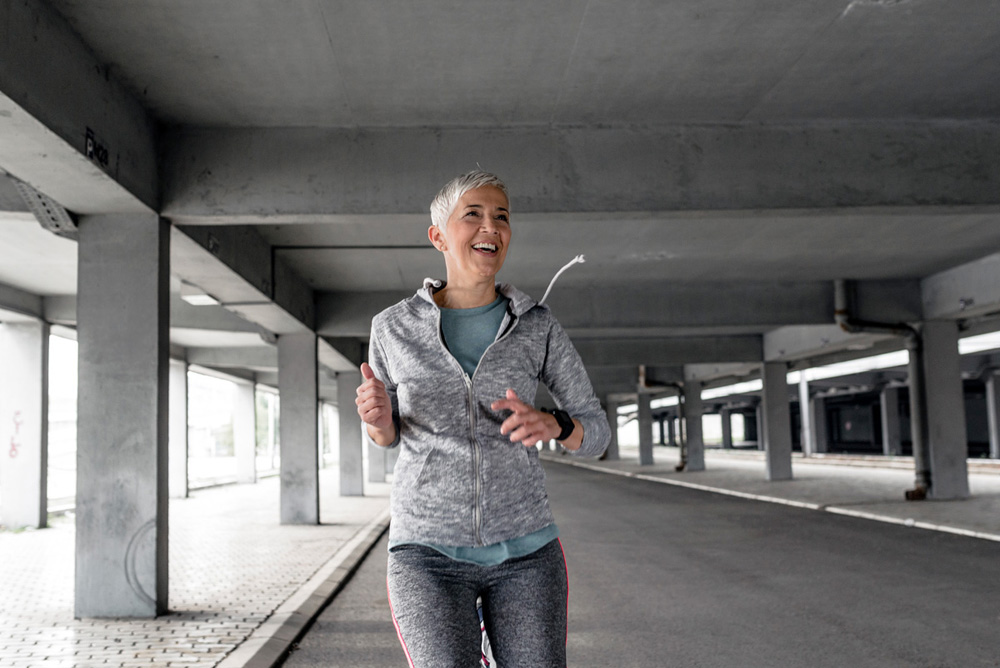The positive outcomes of exercising during breast cancer treatment
Research has shown that physical activity can have benefits for breast cancer patients who are either undergoing treatment or are recovering from treatment.1-4 Some of the general benefits of exercise or physical activity for breast cancer patients may include:2-4
- Helping with cancer related fatigue
- Increased energy
- Better quality of sleep
- General health (i.e. immune system function, bone density)
- Generally improved quality of life
You can speak with your doctor on the types of exercise to consider during, and after breast cancer treatment. They will likely be able to further advise what a suitable exercise program might be, or direct you to appropriate resources.
What do I need to consider when starting an exercise program during breast cancer treatment?
Whilst exercise may be beneficial for people with cancer, there is no one-size-fits-all approach.5 Every person’s circumstances are unique and these should be taken into account.5 Tailored exercise programs designed by an exercise professional that include both aerobic and resistance training activities have been shown to provide benefits. 1-3 There is evidence that suggests those who engage in appropriate exercise during treatment may be better able to cope with fatigue and also have a higher quality-of-life compared to those who do not.1-5
Becoming more active and/or learning to do new activities may seem difficult during treatment and early recovery.5 Some days can be better than others, and any approach to exercise during treatment should be with the purpose of staying within your comfort zone, in a supportive, safe and understanding environment.2,5
Types of exercise you may like to consider
It is recommended that you plan your personal exercise programme with a professional, and a few types of exercise for you to consider are:5
- Walking or jogging
- Yoga
- Pilates
- Swimming
- Golf
- Gym classes with an instructor
Hints on how to maintain regular exercise during breast cancer treatment
- Speak to your doctor(s) and treatment team about how to create a personalised exercise program, or how to find an exercise professional, who can tailor on to your specific needs.2,5 you can also do the following:2,5
- Speak to an exercise professional about setting short- and long-term goals, and think about rewarding yourself when you achieve your goals
- When discussing the framework for your exercise program, think about including forms of exercise that you enjoy or perhaps something new that is appropriate and takes your unique circumstances into account
- Buddy up with a friend to make exercising fun and inspiring
- Alternate the type of exercise you do to increase your motivation and interest
- It may be a good idea to schedule exercise into your daily schedule, with the idea being that you will stick to your daily plan of activities
- Keep track of the exercise you do in a diary or app of your choosing
- Listen to music or podcasts when exercising to make it more energising
How can I get the most out of exercise?
You can try the following to get the most out of an exercise program:5
- Keep in regular contact with an exercise professional, and speak to them about optimising your exercise program to suit your individual circumstance
- Exercise in a safe environment
- Listen to your body. It is okay to have a day off, to take a break from exercise if you are not feeling well, and to recognise that some days can be better than others during treatment
- Stay hydrated
- Eat a nutritious diet, that is appropriate for your personal needs. You can speak with your doctor on how to find out more on what a nutritious meal plan may be
- See your treatment team regularly
Hear from GenesisCare radiation oncologist Dr David Schlect as he discusses how exercise can benefit cancer patients during their treatment.
Can exercise help manage lymphoedema?
Lymphoedema is a swelling and discomfort in the arm, hand, breast or torso following treatment, due to a blockage in the lymphatic system.5,6 It can be a possible side-effect of breast cancer treatment.5,6 Gentle exercises can have a beneficial effect in managing and preventing the symptoms of lymphoedema.5,6 Check with your treatment team for advice and guidance around what might be some appropriate movement exercises that are suitable for your needs.
Disclaimer
Any medical procedure or treatment involving the use of radiation carries risks, including skin irritation and associated pain. Before proceeding with treatment, you should discuss the risks and benefits of the treatment with an appropriately qualified health practitioner. Individual treatment outcomes and experiences will vary.
Please note: The links below are outside of GenesisCare who cannot accept responsibility for the content.
- Ki-Yong A, et al. Int J Cancer. 2020;146(1):150-160
- Wirtz P and Baumann. Breast Care (Basel). 2018; 13(2): 93–101
- Mavropalias G, eta l. Breast Cancer. 2023;30(1):139-150
- Australian Government. Cancer Australia. [webpage]. Breast Cancer: Exercise. Last updated Oct. 2020 [cited July 2023]. Access from: https://www.canceraustralia.gov.au
- Breast Cancer network Australia [webpage]. Exercise and Breast Cancer. Last Updated Sept. 2014. [cited July 2023]. Access from: https://www.bcna.org.au
- Hasenoehrl, T et al. Support Care Cancer. 2020; 28(8): 3593–603.



